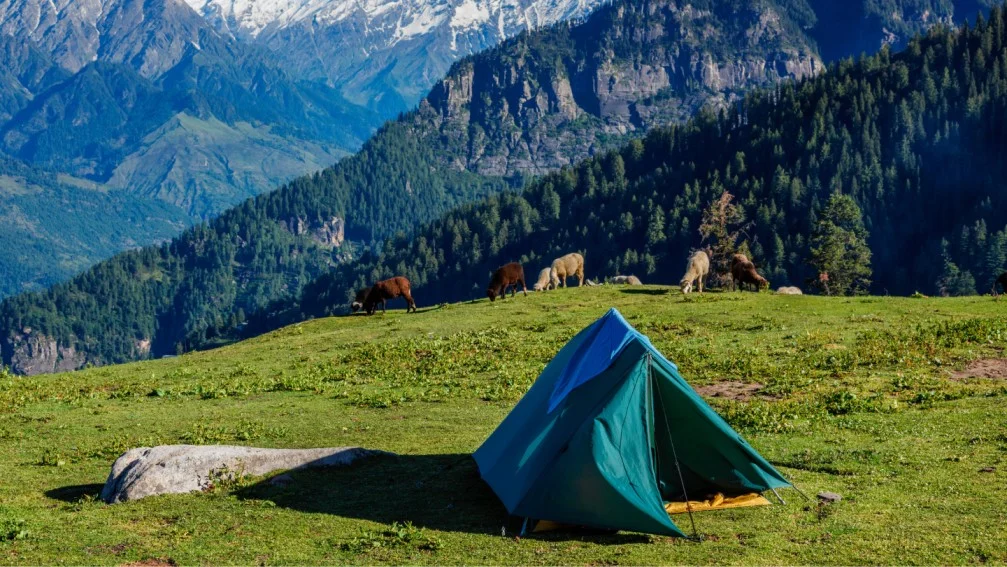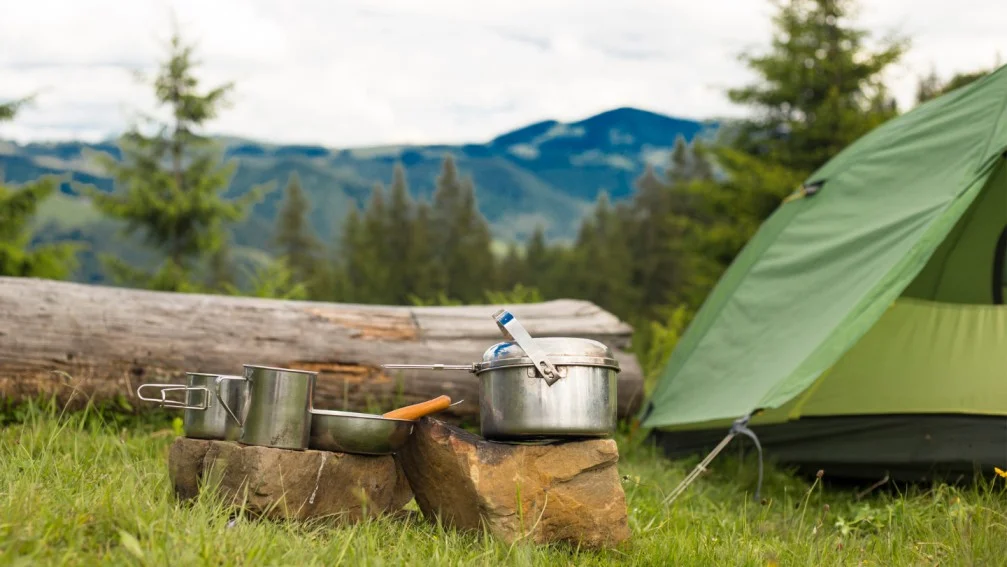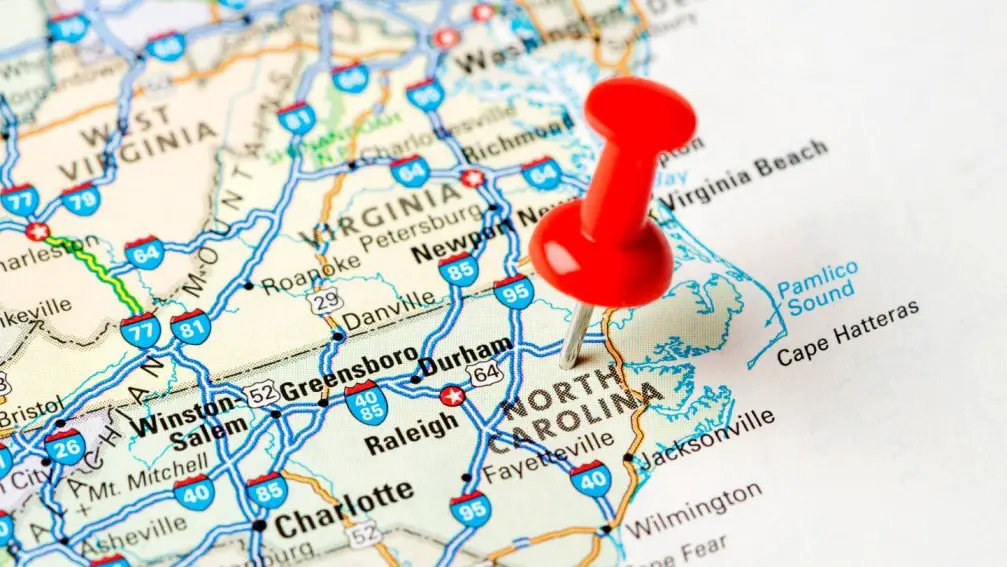Mountain camping involves setting up a temporary shelter in mountainous regions to experience nature and adventure. It offers a unique outdoor experience.
Mountain camping provides an escape from urban life, allowing people to reconnect with nature. The fresh air, stunning views, and tranquillity make it a popular choice for outdoor enthusiasts. Campers can engage in activities like hiking, fishing, and star-gazing. It’s essential to be well-prepared, as mountain weather can be unpredictable.
Proper gear, food supplies, and safety measures ensure a comfortable stay. Mountain camping also promotes physical fitness and mental well-being. Whether you are an experienced camper or a beginner, mountain camping offers an unforgettable adventure.
The Allure Of Mountain Camping
Mountain camping draws many with its promise of stunning views and fresh air. Escaping into nature’s heights offers a unique experience. It combines adventure with tranquility, catering to both thrill-seekers and peace lovers.
Why Choose The Heights?
Choosing mountain camping means embracing a world above the ordinary. The air is cleaner, the views are breathtaking, and the stars seem closer. High altitudes offer a refreshing break from everyday life.
The serene environment helps you disconnect from technology and reconnect with nature. The physical challenge of hiking to a campsite adds to the sense of accomplishment. Each step taken uphill builds anticipation for the vistas ahead.
The Unique Charm Of Elevation
Mountain camping’s charm lies in its elevation. The higher you go, the more unique the landscape. From lush forests to rocky peaks, each level offers something new.
At higher altitudes, the flora and fauna change, providing a diverse experience. You might spot rare birds or unique plants not seen at lower levels. The cooler temperatures at elevation also offer a refreshing escape from the summer heat.
| Benefits | Description |
| Stunning Views | Enjoy panoramic landscapes and breathtaking sunsets. |
| Fresh Air | Breathe in the crisp, clean mountain air. |
| Starry Nights | Experience clear skies filled with countless stars. |
Reconnect with nature- Physical challenge and accomplishment
- Diverse landscapes and wildlife
Preparing For Your Adventure
Mountain camping offers a unique and rewarding experience. Proper preparation ensures safety and enjoyment. Let’s dive into the essential steps to get ready.
Essential Gear Checklist
Having the right gear is crucial for mountain camping. Here’s a list of must-have items:
- Tent: A sturdy, weather-resistant tent is essential.
- Sleeping Bag: Choose a sleeping bag suitable for cold temperatures.
- Backpack: A durable backpack with multiple compartments.
- Clothing: Layered clothing to handle varying weather conditions.
- Footwear: Sturdy hiking boots with good grip.
- Cooking Supplies: Portable stove, fuel, and utensils.
- First Aid Kit: A well-stocked first aid kit for emergencies.
- Navigation Tools: Map, compass, or GPS device.
- Hydration: Water bottles and purification tablets.
- Food: Non-perishable, high-energy food items.
Physical And Mental Readiness
Preparing yourself physically and mentally is equally important. Here are some tips:
- Physical Fitness: Engage in regular exercise to build stamina and strength.
- Mental Preparation: Visualize the trip and plan for potential challenges.
- Knowledge: Learn basic survival skills and first aid.
- Acclimatization: Spend time at higher altitudes before the trip.
- Stay Positive: Maintain a positive mindset throughout your adventure.
Ensuring both your body and mind are prepared can make your trip more enjoyable and safe. Happy mountain camping!
Selecting Your High-altitude Haven
Mountain camping offers incredible views and a refreshing escape. Choosing the right location is essential for a memorable trip. Below, explore how to find the perfect mountain campsite.
Researching Mountain Campsites
Start by researching mountain campsites that fit your preferences. Use online resources, guidebooks, and maps. Look for campsites that offer scenic views, water sources, and safe terrain. Reviews from other campers can provide valuable insights.
- Check for amenities like fire pits and restrooms.
- Ensure the campsite has level ground for your tent.
- Look for sites with proximity to hiking trails.
Permits And Regulations
Many mountain campsites require permits. Check local regulations before planning your trip. Some areas limit the number of visitors to protect the environment.
| Permit Type | Details |
| Backcountry Permits | Required for remote areas. |
| Fire Permits | Needed for campfires in some locations. |
Always follow regulations to protect nature and ensure a safe experience. Carry a map and know the rules of the area. Respect wildlife and leave no trace behind.
Safety Above The Clouds
Mountain camping is an exciting adventure. But safety is crucial above the clouds. This guide helps you stay safe while enjoying the views.
Navigating Weather Challenges
Weather in the mountains is unpredictable. Always check weather forecasts before your trip. Pack gear for all conditions. Bring waterproof clothing and sturdy boots.
Create a shelter plan. Know how to set up your tent quickly. Strong winds and sudden rain are common. Be prepared for snow, even in summer.
Use a weather radio. It helps you get updates in remote areas. This ensures you stay informed and safe.
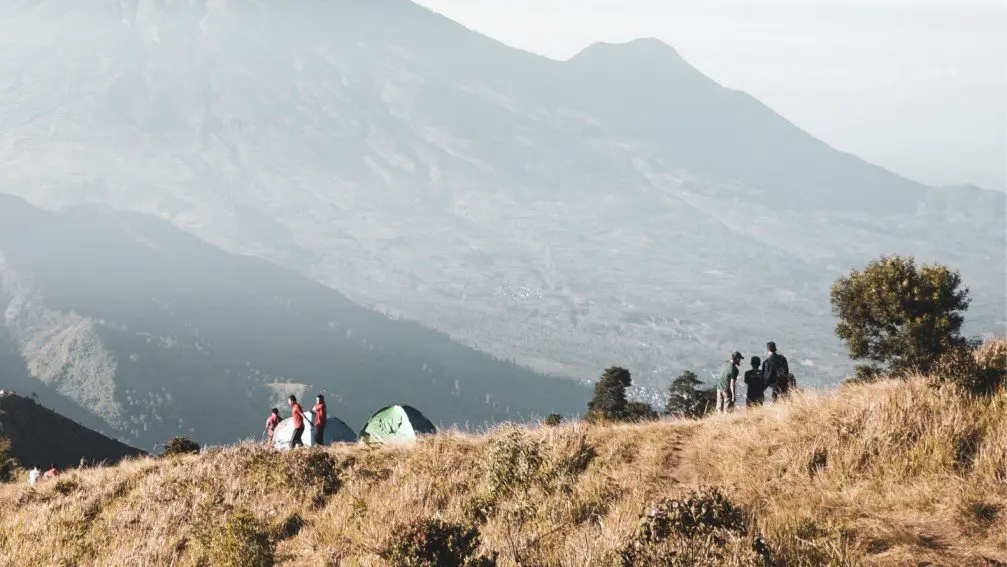
Wildlife Encounters And How To Manage Them
Wildlife is part of the mountain experience. Animals like bears and deer can be seen. Keep a safe distance from all animals.
Store food properly. Use bear-proof containers. Never keep food in your tent. This reduces the chance of attracting animals.
Know how to react if you see wildlife. Make noise to avoid surprising animals. Stay calm and back away slowly.
| Animal | Safety Tip |
| Bear | Use bear spray and make noise |
| Deer | Keep a safe distance |
| Snake | Watch your step and avoid dense brush |
Sustainable Mountain Camping
Sustainable mountain camping is more than just an outdoor activity. It is a commitment to preserving nature. Campers must respect and protect mountain ecosystems. This ensures future generations can enjoy the beauty and serenity of mountains.
Leave No Trace Principles
The Leave No Trace principles guide campers to minimize their impact on nature. Following these principles is essential for sustainable mountain camping.
- Plan Ahead and Prepare: Know the area and weather. Pack essential gear.
- Travel and Camp on Durable Surfaces: Stick to trails and campsites. Avoid fragile areas.
- Dispose of Waste Properly: Pack out all trash. Use bathroom facilities or bury waste.
- Leave What You Find: Do not pick plants or disturb wildlife. Leave rocks and artifacts.
- Minimize Campfire Impact: Use a camp stove. If you must build a fire, keep it small.
- Respect Wildlife: Observe animals from a distance. Do not feed them.
- Be Considerate of Other Visitors: Keep noise levels down. Yield to other hikers.
Protecting Fragile Mountain Ecosystems
Mountain ecosystems are delicate and unique. They require special care to remain healthy.
Avoid trampling on vegetation: Stick to established paths. Avoid creating new trails.
Protect water sources: Camp at least 200 feet from lakes and streams. Use biodegradable soap.
Respect wildlife habitats: Do not enter areas marked off-limits. These areas are for wildlife protection.
Limit group size: Smaller groups cause less damage. Consider splitting larger groups.
| Action | Impact |
| Use a camp stove | Reduces risk of wildfires |
| Pack out all trash | Keeps the environment clean |
| Respect wildlife | Maintains animal health and safety |
The Mountain Camping Experience
Mountain camping offers a unique escape from daily life. It provides stunning views, fresh air, and peaceful surroundings. This adventure brings you closer to nature’s beauty and tranquility.
Setting Up Camp In The Sky
Setting up camp in the mountains requires careful planning. Choose a safe and level spot for your tent. Ensure your campsite has some protection from the wind. Bring lightweight and durable gear. This includes a sturdy tent, sleeping bags, and cooking supplies.
| Essential Gear | Description |
| Tent | Lightweight, durable, and weather-resistant |
| Sleeping Bag | Warm and comfortable for cold nights |
| Cooking Supplies | Portable stove, pots, and utensils |
Keep your food secure from wildlife. Use bear-proof containers or hang food from a tree. Always follow the Leave No Trace principles to protect nature.
Night Under The Stars: A Unique Experience
Spending a night under the stars in the mountains is magical. The sky is clearer and the stars shine brighter. You might see shooting stars and constellations. Bring a star map or a stargazing app to identify stars.
Gather around a campfire, if allowed, and share stories. Enjoy the sounds of nature like rustling leaves and distant animal calls. These moments create lasting memories and a deep connection to nature.
- Clear, starry skies
- Peaceful, natural sounds
- Quality time with friends and family
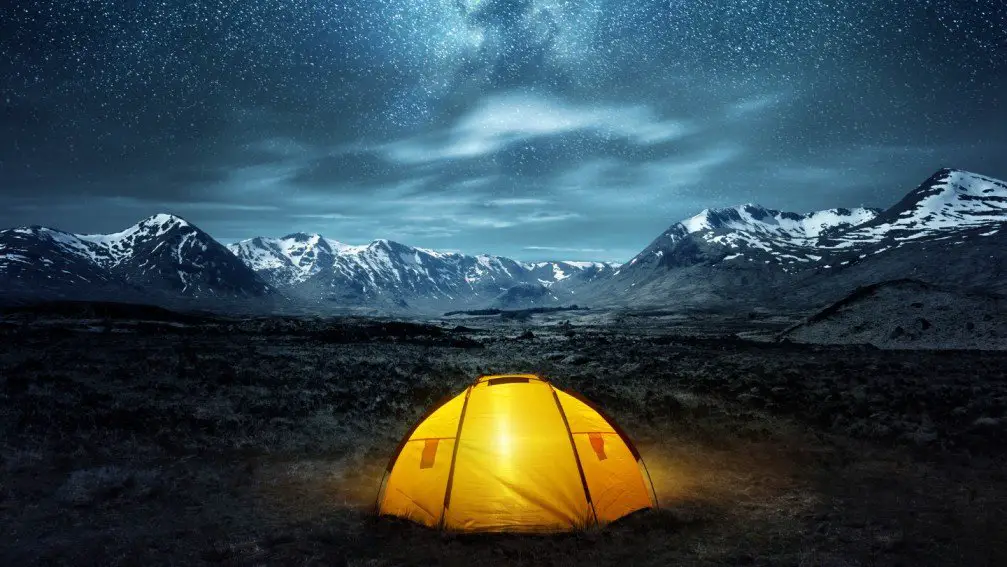
Activities And Exploration
Mountain camping offers exciting activities and endless exploration opportunities. The breathtaking landscapes and serene environment make it an ideal getaway. Whether you are an adventurer or a nature lover, mountain camping has something for everyone.
Hiking Trails To Explore
One of the most thrilling activities in mountain camping is hiking. There are numerous hiking trails that cater to all skill levels. Beginners can enjoy short, easy trails, while experienced hikers can tackle more challenging paths.
- Easy Trails: Perfect for families and beginners. These trails are short and have gentle slopes.
- Moderate Trails: Ideal for those with some hiking experience. These trails have steeper inclines and longer distances.
- Difficult Trails: For seasoned hikers. These paths are steep, rocky, and require endurance.
Always carry a map, water, and snacks. Wear comfortable shoes and dress in layers.
Photography And Journaling
Mountain camping offers stunning views and unique photography opportunities. Capture the beauty of nature with your camera. The changing light and diverse landscapes make for great photos.
Journaling is another rewarding activity. Write about your experiences and the sights you see. Note the different plants, animals, and weather patterns. This helps you remember your trip and adds a personal touch to your adventure.
| Photography Tips | Journaling Tips |
| Use natural light for the best shots. | Write daily entries for a detailed account. |
| Capture wide landscapes and close-up details. | Include sketches of plants and animals. |
| Experiment with different angles. | Describe the sounds and smells around you. |
Combining photography and journaling creates a lasting memory of your mountain camping trip.
Returning Home
Mountain camping brings many adventures and unforgettable memories. Returning home is also a part of this journey. It is important to leave nature as you found it and reflect on your experiences. This section covers essential steps to ensure a smooth return home.
Cleaning And Leaving No Trace
Mountain camping requires respect for nature. Cleaning up your campsite is crucial. Always pack out all trash. Leave nothing behind.
- Collect all garbage and pack it out.
- Remove all food scraps and litter.
- Inspect the campsite for any forgotten items.
Ensure the campsite looks as it did before. Avoid leaving any marks. This helps preserve nature for future adventurers.
Reflecting On The High-altitude Adventure
After cleaning up, take time to reflect. Think about the highs and lows of your journey. What did you learn? What will you remember most?
- Review your gear and note any improvements needed.
- Jot down memorable moments in a journal.
- Plan your next mountain camping adventure.
Reflecting helps you grow as a camper. It prepares you for future trips. Celebrate your achievements and plan for more adventures.
FAQs:
What Are The Three Types Of Campsite?
The three types of campsites are: 1. **Tent Campsites**: Ideal for traditional camping with tents. 2. **RV Campsites**: Designed for recreational vehicles with necessary hookups. 3. **Backcountry Campsites**: Remote areas for hiking and wilderness camping.
What Is The Difference Between Camping And Campsite?
Camping is an outdoor activity involving overnight stays in nature. A campsite is a designated area where people camp.
What Is The Most Basic Type Of Camping?
The most basic type of camping is tent camping. It involves setting up a tent in a natural setting. Essentials include a sleeping bag, basic cooking gear, and minimal amenities.
Is Cliff Camping Safe?
Cliff camping can be safe with proper gear and experienced guides. Always prioritize safety and follow expert advice.
Mountain camping offers a unique blend of adventure and tranquility. It’s a perfect escape from the daily grind. Embrace nature, enjoy breathtaking views, and create unforgettable memories. Whether you’re a seasoned camper or a beginner, mountain camping provides an enriching experience.
Plan your trip and discover the magic of the mountains.

